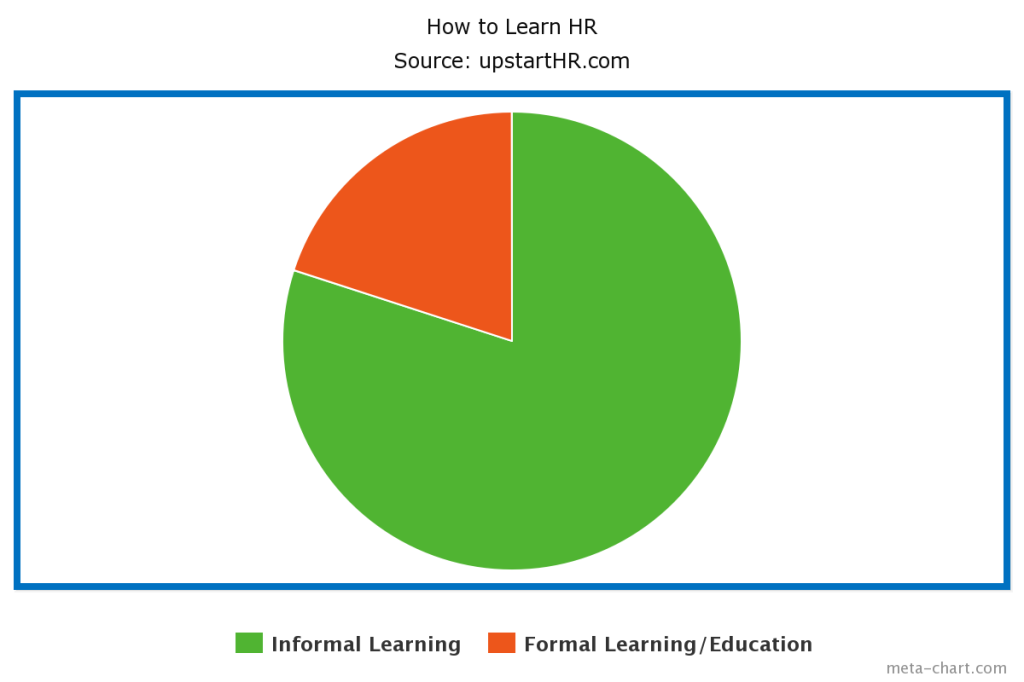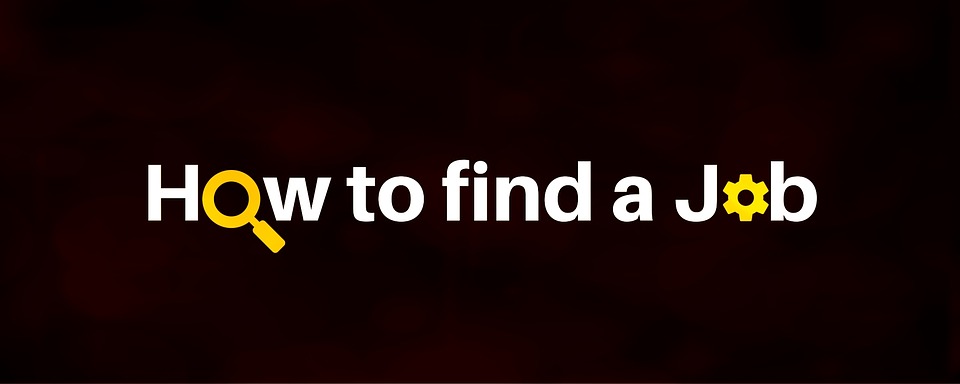Update: I published a newer version of this. You can find it here: 40+ Free HR Training Sources
——
Recently on LinkedIn I saw someone asking how to learn HR. Specifically he was trying to learn compensation when he didn’t have a background/foundation in the topic. The people in the comments made some good suggestions, but many of them involved expensive certifications, workshops, and other similar costly avenues. Coming from a background of smaller organizations with limited budgets (and understanding the personal budget of a new HR pro), I know that most of those suggestions are not possible for a significant number of people. Today we’ll look at how to learn HR from the ground up in some of the most practical, and inexpensive, ways possible.
Whether you’re just thinking about getting into HR, you’re just starting out, or you have some experience behind you and you want to grow your skill set, you’re going to walk away from this article with some good ideas on how to do that.

First, Let’s Flash Back to 2009
In 2009 when I started this blog, I was thinking a lot about recent HR grads and the world of HR education. Let’s revisit, because it sets up the rest of this article nicely as far as a true need for HR-related information.
HR education isn't all it's cracked up to be. The colleges and universities are living in a different age. And although some of them are trying to upgrade with technology, they're still using textbooks as the major instructional material. And who writes those textbooks? Well, I'm sure they're smart people, but for the most part, they are not involved with the day-to-day business world. For some students in technology-rich fields, their college education may be obsolete by the time they graduate. This scathing comment from a recent study:
“College was a total waste of time and money. Computer courses are bordering on obsolete by graduation. There were not nearly enough computer courses in my degree program. I gained no skills to get me a job.â€
— anonymous computer information systems grad
Maybe it's time for someone to offer something revolutionary in terms of HR education?
Here's a novel idea. Why don't we take some measure (not all, mind you) of education from the HR blogs that already exist? There are dozens (hundreds?) of wonderful people pouring their hearts and efforts into maintaining a blog that describes the ins and outs of human resources. What if schools had some sort of HR education curriculum that required—or at the very least suggested—its students study from those actively participating in the field? How revolutionary would that be?
I only found out about the prevalence of the blogosphere when I was nearly finished with college. And that was only through my own personal research on topics that are unrelated to human resources. I stumbled across a few blogs and loved the community-like atmosphere and the availability of information.
I have long believed that to be great in HR you need to go beyond the knowledge that formal education offers. That’s only about 20% of what is necessary to be great in this profession. The other 80% is learned afterward in various ways.

Qualitative Data Comes First
Back when I was a wee lad just thinking about entering the HR profession, I had a mission. This was pre-LinkedIn, so there was no easy way for me to do this. I spent hours scouring websites for local and regional companies and then emailing the HR contacts from the website with a few questions. Unfortunately I don’t have the exact list of questions any more, but here are a few of them:
- What is the average day like for someone working in human resources?
- What sort of training or education did you have that prepared you for this job?
- What is the biggest challenge you regularly face?
- What’s the best thing about your job?
I received dozens of responses from all of those hours of work. I actually created a few research papers in college based on that information, but more than that, it helped me get a glimpse into the world of HR that my classmates did not. This concept is going to come into play again in just a moment, but I wanted to introduce it here first. The purpose is to gather qualitative data about what to focus on and that will guide future learning. Without it the learning is haphazard and without structure.
As you know I am a firm believer in using books for learning (the latest in the series on that is about making a leadership reading list), but I’m staying away from that medium for purposes of this post because they are not free and because I want to focus on nontraditional ways to learn this information.
How to Learn HR Skills for Free
Remember the example I started this article with of the young man looking to learn more about compensation? Here’s the first half of the response I provided:
Surprised nobody here has mentioned Payscale.com for free research, white papers, etc.
Let’s analyze that, shall we?
First, I mention a vendor website. Payscale sells compensation data and tools to businesses. So why would I recommend them? Because they have a wealth of free resources, white papers, webinars, and other information on their site. I could spend a day just reading and listening to the content there and have the equivalent of a basic college level compensation course work of information in my brain. And it cost me nothing but a little time. As far as how to learn HR, that’s not a bad way to go.
And the fun thing is that this is just one vendor. There are hundreds, and many of the larger ones provide these same free tools to help us. Not sure where to go? Here are a few suggestions just to get you thinking. I spent half an hour researching these for you guys and this is just scratching the surface!
Recruiting
Talent Management
Compensation
Benefits
Training
HR Technology/Various
Now, obviously when these types of companies are sharing these resources their ultimate goal is to use them as marketing to drive you to their products, but you’re certainly not obligated to purchase anything. These resources are free, and you should take advantage of them.
How to Learn HR (And Get Paid To Do It)
I’ve written fairly extensively on getting into HR, breaking into the profession, etc. On the job training still one of the best ways to explore experiential learning, and if  you can lock in a job, you get paid while you’re learning.
More info on those topics:
You might assume that you have to have some of this education in order to get a job in HR, but it’s certainly not the case. Plenty of people move into an HR career without that sort of education or knowledge.
One thing that is worth noting here: your job will not cover all types of things you can learn in HR. That is why it’s important for you to keep up the momentum in the other tactics listed here so your learning does not suffer and you don’t get stuck in that job forever. If you keep learning and growing, you’ll be ready for the next step on the career ladder when it’s time to make that move.
How to Learn HR from Real People
Now, the other half of the response I provided to the request for information is equally important. Here it is:
Try to find some people in your local HR community that “do” compensation and spend an hour or two with each to understand what works for them, what doesn’t, and what they would have liked to know if they had to start over.
This is exactly what I did when I started learning human resources, and it’s still a powerful tactic today. Again, with tools like LinkedIn this makes the whole thing so much easier.
When I hear from people just getting into the field, one of the first things I recommend is for them to find some trusted contacts to start building out their network. Over the years I have been able to connect with hundreds of great HR pros, and some of them have amazing specialties.
For instance, one lady I coached during PHR/SPHR prep last year is a compensation and tax whiz. If I have questions on how to handle taxes for an employee, I could easily pick up the phone or shoot her an email. If I have questions about incentives and motivation, I’ll reach out to Paul. Â Heck, if I just need a pick me up I’ll read anything Steve Browne writes.
Get the picture? We don’t have to feel like we are in this thing all alone. We also don’t have to figure out every single piece of it by ourselves without help or support. There are so many great resources and people out there that we can connect with. Figuring out how to learn HR is not just a solo act.
While the web has helped with this and made it more easy to scale up, it has also made some of those connections more shallow. That’s why I also think it’s critical to build a local network of people as well. Within my local area I have a couple dozen HR pros I could call today if I had a question or just wanted to hash out an HR problem I’m dealing with.
That took time, trust, and effort to build, but I started with just one person who took pity on me as an introvert and introduced herself to me at a SHRM chapter workshop all those years ago. I’ll always remember that first interaction. If you’re looking to build out your own network, I’d encourage you to connect with your local chapter. Being a member is helpful, but the best benefits come when you volunteer on the SHRM chapter board and really get involved.
How to Learn HR: Blogs
Read. A. Blog.
Okay, so not all blogs are worth reading. True. However, if you have curated content from someone you trust, that can help to keep the quality high and give you some good, free knowledge. This has been another key part of my learning strategy, especially in those crucial early months when I was just trying to understand how this whole thing worked.
When I talk with college students about HR, I tell them that with a degree specifically in human resources they know about 20% of what they need to be successful. The rest comes from experience, additional learning sources, networking, etc. I always point them to blogs, because those were a major part of my informal education beyond college. I can still remember reading two PHENOMENAL writers, Frank Roche and Chris Ferdinandi, and I can easily trace some of the philosophies I have about how I do HR back to things I read from those two individuals. There are certainly others, but those were the first two I really ran across and latched onto as I was working on understanding HR.
So, how do you find blogs? The HR Carnival is a “traveling” blog collection of some good content in the HR/recruiting space. I recently wrote one themed on Strategic HRM, and I would encourage you to check it out it if you haven’t already.
Otherwise, check out the sites I link to regularly. I don’t link to low quality blogs or sites that I don’t know.
Pro tip: use a tool like Feedly to double your blog reading speed.
If you want to know how to learn human resources management, blogs provide a very easy way to do that.
How to Learn HR: HR Podcasts
Okay, maybe you’re not a huge fan of reading. I have two things to say:
- Get over it. You’ll need to use that skill often and it’s better to practice it and do it well than try to avoid it and do it poorly. :-)
- There are other options besides just reading.
Over the past few years several great HR podcasts have surfaced and they are free and provide great information that you can listen to at work, at home, in the car, on a run, feeding a baby at 3am… Yeah, something has to keep me awake when I’m feeding the little guy and it might as well be educational, right? :-)
Here are some of the best HR podcasts you can catch. Pro tip: certified HR pros can get recertification credits for listening to HR podcasts!
- HR Happy Hour – I’ve been a listener of this show from the very first HR Happy Hour episode, and it has been amazing to follow. Steve Boese has really delivered some great information and entertainment for his audience. The topics for the show (employer branding, the future of HR, technology, and work/life balance, for example) are varied, but the friendly, conversational nature makes it easy for anyone to become an addicted listener.
- Drive Thru HRÂ was designed to be a captivating and easy-to-digest lunch discourse that covers topics relevant to HR professionals. Each 30-minute episode features a guest speaker who shares her or his knowledge and experience in human resources. Our hosts and special guest cover a wealth of topics, including HR Technology, Recruiting, Talent Management, Leadership, Organizational Culture and Strategic HR, every day at 12:00 pm Central Time.
- Xenium HR for Small Business podcast focuses on HR topics of interest to all HR professionals, whether at a small business or not.
- Ultimate Software has a selection of podcasts on key topics of interest to HR and payroll professionals, delivered to your desktop on-demand. This series is presented by Ultimate customers and other industry thought leaders on topics that can contribute to company success.
- CIPDÂ publishes a new podcast on the first Tuesday of every month. Each episode is like a short radio show, focusing on a workplace or people management topic.
- SuccessFactors doesn’t update their podcast any more, but there are dozens of great episodes of People Performance Radio you can still use to learn more about HR.
How to Learn HR: HR Videos
The other medium to explore is video. I ran across a few YouTube channels that would be worth checking out for some great content to dig into. While you’re not getting 2-3 hour lectures (I’m sure you can find that if you’re really interested!), you are getting information that will help you to learn HR and improve your knowledge.
- SHRM (link) I haven’t mentioned SHRM anywhere else in this article because much of what they offer is not free and is hidden behind the pay wall. However, the content on their YouTube channel is free high quality.
- MeetTheBossTV (link) I have followed MeetTheBoss for a while now and really like the executive viewpoints, the high quality video, and the interesting discussions. This is not all HR content, but I found over 30 minutes of HR specific, strategic discussions within a minute or two of searching.
- Human Resources Magazine (link) while they haven’t updated their channel in a while, I found some great content that would be worth reviewing.
Learning HR doesn’t have to be difficult or painful! Yes, some lessons have to come with experience and a series of trial and error, but you can pick up much of the knowledge you need from these types of resources.
- What questions do you have about how to learn HR?
- What is your biggest challenge in this area?
- What has worked for you?

 I am now the Principal Analyst at
I am now the Principal Analyst at 


 For the past three and a half years I have worked at Pinnacle, an amazing company with some amazing people who do amazing things. In short: it’s been an awesome experience and I can’t imagine my life without it.
For the past three and a half years I have worked at Pinnacle, an amazing company with some amazing people who do amazing things. In short: it’s been an awesome experience and I can’t imagine my life without it.